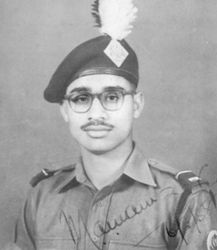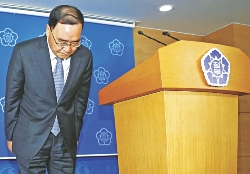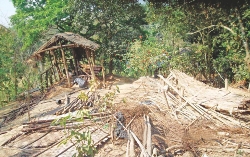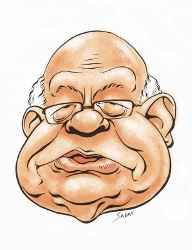Drama over enquiry
�

Desk Report : The move to implicate General Manzur in Ziaur Rahman's killing had begun rolling within hours of the assassination. Major General Mir Shawkat Ali and Major General Moinul Hossain Chowdhury had perceived this on the morning of May 30.
This had become clearer to Shawkat and Moin through hearing the discussions at a meeting of top generals at the office of Army Chief General HM Ershad at the army headquarters in Dhaka.
Gen Moin, who had had telephonic conversation with Manzur after Zia's killing, was convinced that Manzur was not involved in the assassination.
He had given his impression to Ershad and other senior officials present there. He had also strongly opposed the hurried publicising of the announcement through radio and TV implicating Manzur in the Zia killing without any investigation being done.
But Ershad and some of the officers had vehemently tried to convince
Moin that the assassination was perpetrated under Manzur's leadership.
"A conspiracy is being hatched here to implicate General Manzur [in Zia killing]", Shawkat and Moin told Air Vice Marshal Sadar Uddin as the air force chief was leaving the army chief's office.
The air chief, who had flown to Dhaka from Jessore airbase in the morning, went directly to the army headquarters to meet Ershad. The army chief early on May 30 informed Sadar uddin over the phone about the killing of Zia and asked him to return to Dhaka as soon as possible.
Sadar Uddin stayed for around 20 minutes at the army chief's office. While he was leaving, Shawkat and Moin followed him. At the corridor, both the army generals expressed their fears about implicating Manzur in the killing of the president.
"I don't think Manzur could have done it," said Shawkat, who later joined the BNP founded by Zia after his retirement and became a minister in the Khaleda Zia-led government [1991-1996].
Sadar Uddin did not say anything and left the army headquarters for his office at the air force headquarters.
The conspiracy against Manzur was revealed to some extent the next day before Sadar Uddin. During a meeting with acting President Abdus Sattar at the Bangabhaban, DGFI chief Major General Mohabbat Jan Chowdhury had shown the air chief a piece of paper carrying a few lines written in pencil.
"This message has come for you," the DGFI chief told the air chief.
Sadar Uddin went through the message sent to him by Manzur in which Manzur reportedly acknowledged his responsibility for the coup in Chittagong and sought air force help.
"How have you got this message," the air chief asked the DGFI chief, who later became a minister in the Ershad regime.
"The message has come through police radio."
The air chief had found the message unbelievable, destroyed it and threw it into the wastepaper basket.
A dead man never speaks. This truth appeared to be a blessing for those who had designed the plan to implicate Manzur in the Zia killing. So they inaugurated a new chapter after the murder of Manzur to implicate him formally in Zia's assassination through a stage-managed court of inquiry into the circumstances of the killing of Zia and Manzur.
The DGFI chief visited Chittagong on June 3 or 4. During his visit, he met Brigadier Abdul Latif and advised him to maintain communications with Brigadier Azizul Islam regarding making identical statements on the Manzur murder before the inquiry committee. The committee was formed a few days later. Ershad had ordered the two brigadier generals to finish Manzur.
"Police were too involved in this," Latif told Mohabbat Jan.
"Mostafiz [home minister] will look into the police side," replied Mohabbat Jan.
One day, Aziz made a phone call to Latif and spoke to him about the statements.
The inquiry committee was formed. It was headed by Major General Muzammel Hossain. Latif had given the statement as per Aziz's directive. He told the inquiry committee that soldiers had snatched Manzur and killed him. The same story Aziz told the chief of general staff Major General Nur Uddin over telephone after the murder of Manzur.
Aziz was active again, this time to manipulate the inquiry court.
He summoned Lt Col Shamsur Rahman, who along with Major Kamal had put pressure on Captain Emdad to execute Manzur without delay, to appear before him at his office in the evening on either June 4 or 5 in 1981.
Aziz dictated to Shams a deposition about the murder of Manzur for Captain Emdad, Nayeb Subedar Ashraf, Havildar Malek, driver Sadaruddin and for himself as all of them would have to testify before the inquiry committee.
Lt Col Shams followed his dictation and completed writing it. Aziz gave it to his personal assistant for typing. On completion, Aziz handed over all the copies of the deposition to Shams.
Shams kept his one to himself and handed over the rest to Emdad and the others. He asked them to sign their names in their own copies. Next day, Emdad returned all the copies on receiving the respective person's signature. Shams signed his deposition copy. And he handed over all the copies to Aziz.
In the depositions, all of them unequivocally claimed that some unruly soldiers had snatched Manzur from them, while they were returning from Hathazari to the cantonment, and killed the general.
Aziz later sent all the copies to Major General Mozammel, who was chief of the inquiry court.
Shams did not need to appear before the inquiry court. Emdad, however, did and submitted his written deposition. At one stage, two members of the inquiry court started questioning Emdad on his written deposition. But the inquiry court chief prevented the two members from examining Emdad.
Emdad had also submitted the same copy of his deposition to another inquiry committee, headed by a judge, to investigate the killing of the president.
Major General Moin, then adjutant general, had proposed investigating the reasons behind the mutiny. But Ershad refused to include this in the terms of reference of the army inquiry court.
In protest, Moin had not signed the order of inquiry though being the adjutant general he was supposed to do so. But Ershad himself had signed the order. And the inquiry committee was formed hurriedly.
Ershad had also rejected a proposal to engage British Military Intelligence-5 in investigating in the assassination of Ziaur Rahman. At that time the MI-5 had earned appreciation by unearthing the mystery of many sensational killings in different countries.
More interestingly, then army chief General Ershad had also directed Brigadier Aziz to investigate the murder of Manzur and submit a report. Aziz, who was ordered by Ershad to take Manzur into army custody from police custody and kill him, submitted an inquiry report. But he failed to identify any of those who were involved in the killing of l Manzur.
The army inquiry committee, which was the forerunner of the court martial, had registered the depositions of most of those who were military personnel. The civil inquiry commission, led by a Supreme Court judge, Justice Ruhul Islam, was a sham. Justice Ruhul's commission could neither summon any military officer, nor could it point fingers at anyone for the assassination. The probe reports were never made public.
The inquiry committee recommended holding a court martial of 31 officers and two junior commissioned officers. Most of them were freedom fighters. The camera trial held Manzur responsible for masterminding the rebellion and assassination of President Zia.
In the trial, the first court martial had ordered the death penalty for 12 officers and various terms of jail sentence for 14 others. The remaining defendants were acquitted but they were dismissed from service.
Later, another court martial was formed to try an officer who was ill during the functioning of the first court martial. And he was also sentenced to death.
On completion of the trial, the government published a white paper in August 1981 which was in fact based on the proceedings of the court martial. The whitepaper labelled Manzur as the leader of the failed rebellion and the person responsible for the conspiracy behind Zia's assassination. Manzur was branded posthumously as the leader of the conspiracy to kill Zia. the daily star
Local Time : 0301 Hours, 27 April 2024
�
|
|









